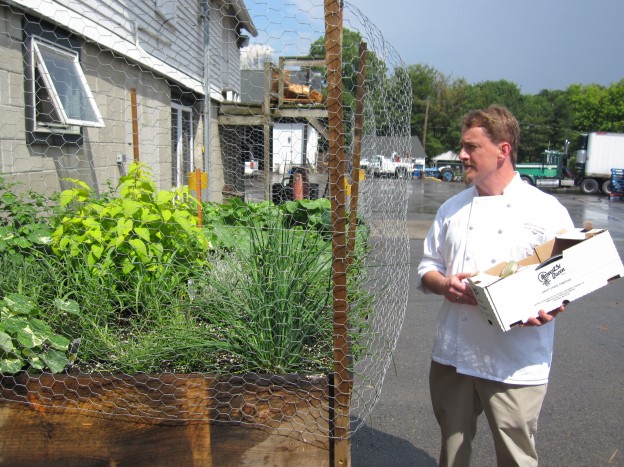
Chef Todd Heberlein outside the Wilson Farm kitchen (photo: Sue McCrory)
Last Saturday I traveled a couple of miles up Mass Ave. in Arlington to Wilson Farm. There was nothing new about the outing: I’ve driven this strip of road near my home innumerable times since Wilson’s, in Lexington, is where I most frequently shop for fruits and vegetables. But never before had I visited the working kitchen at this 127-year-old farm. And, boy, do they work.
A staff of 15 engages in a daily ballet in what can only be described as tight quarters, preparing over 100 entrees and side dishes from whatever Wilson’s farmers have harvested that day. This means a lot of produce. There are over 30 acres of cultivated fields just past the main parking lot at Wilson Farm, plus over 500 acres in Litchfield, NH, that yields corn, tomatoes, peppers, berries and more for both Wilson farmstands in Lexington and Litchfield.
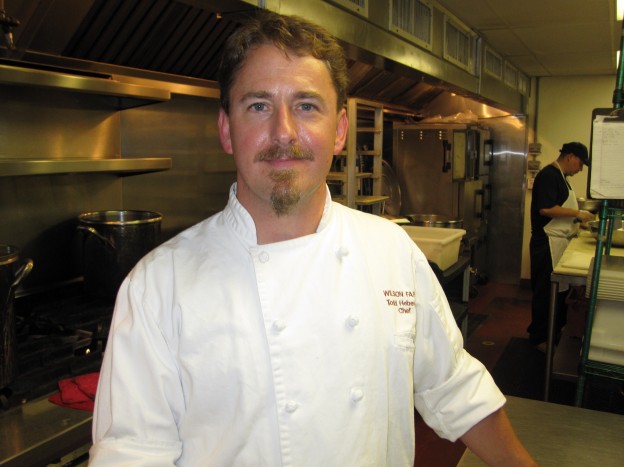
Chef Todd Heberlein (photo: Sue McCrory)
The man in kitchen whites, the one who orchestrates the field-to-fork transformation of Wilson’s daily yield into (literally) farm fresh, prepared foods is Chef Todd Heberlein. Todd hails from New Jersey, but he traversed the country as a young chef to farmers-market-rich Santa Barbara, CA, cutting his teeth in restaurant kitchens. His experiences there, shaped by California’s abundant fresh produce, were formative.
Now settled back East, Todd has served as head chef at Wilson’s for over ten years. He’s been carefully updating the recipes, the practices and even the thinking at the farm’s kitchen for his entire tenure.
The afternoon I visited, dozens of pounds of fresh-picked strawberries were being blended with tart, plain yogurt and a touch of honey to make Strawberry Soup. Roasted asparagus had already come out of the oven, and so had gorgeous salmon fillets. Meanwhile, quesadilla discs were being smothered with cheese and grilled chicken (the farm keeps hens) and generous portions of herbed potato salad were being spooned into containers for sale in the farmstand upstairs. A massive pot of stock was simmering nearby. At 3pm on a summer Saturday, this kitchen looked like it would never stop.
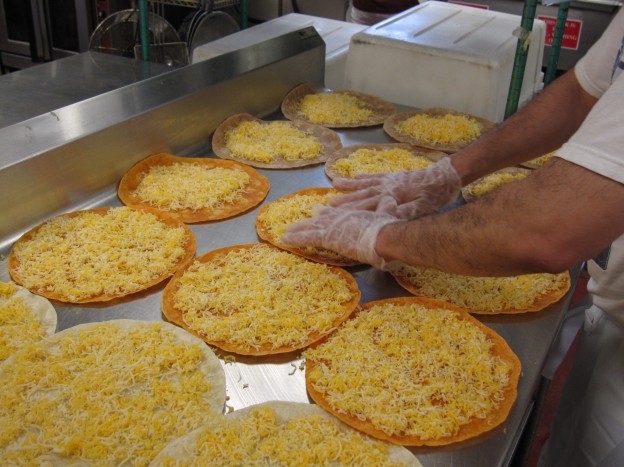
Quesadillas in the making at Wilson Farm (photo: Sue McCrory)
But I had come primarily to speak with Todd about his upcoming participation in the Let’s Talk About Food Festival. At noon tomorrow, June 25th, Heberlein will team up with chef Frank McClelland of L’Espalier to give festival-goers easy, innovative ideas about cooking with farm fresh ingredients.
Pun aside, this is Todd’s bread and butter. “My day changes by what [the farmers] are harvesting,” he says. One of his most recent challenges? “What the [bleep] to do with beets, beets and MORE BEETS!”
Heberlein is constantly crafting new recipes to feed Wilson’s customers and help them feed themselves. A whole bulletin-board’s-worth of individual recipes hangs behind the bank of cashiers at Wilson’s. They’re conveniently-photocopied, easy to grab and made by Todd and team. (I have several in my own recipe box — my favorite, “Leek and Cauliflower Soup.”)
But Heberlein isn’t tied to recipes. Nor would he have you be. “Use them, but don’t be confined,” he urges. Home cooks should “close [their] eyes and ball up the recipe!” To wit, there wasn’t one for the Farmer’s Sandwich Todd had prepped last Saturday in anticipation of tomorrow’s demo on the LTAF Festival Main Stage.
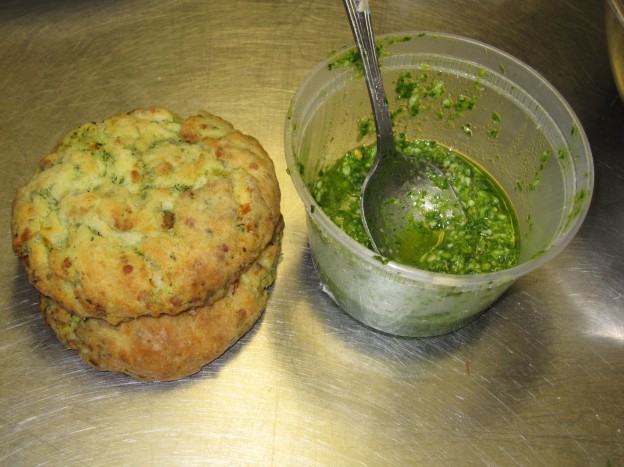
Arugula pesto biscuit (photo: Sue McCrory)
The sandwich’s main components are an arugula-pesto biscuit (one of Heberlein’s creative answers to the 100s of pounds of arugula now being harvested); pulled pork (Wilson’s also raises its own pigs); southern-style braised vegetables; and a knock-your-socks-off fresh slaw of kohlrabi, radishes, garlic scapes, fresh dill, onion and carrot.
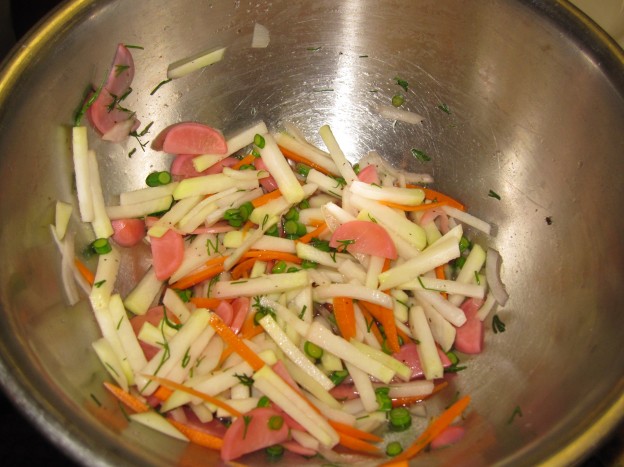
Radish Slaw for a Farmer's Sandwich (photo: Sue McCrory)
Full disclosure: I got to be the first to try this Wilson’s original. Without giving away the how-to, I can tell you it was delicious, and that the slaw is the stealth ingredient. It gives this hearty sandwich structure and a pleasing, pungent crunch.
See and taste for yourself, and meet Todd Heberlein tomorrow. Come on down to the river at noon!

Sounds like Chef Todd Heberlein was born to cook. Who else could keep up with the demands that are required of him and meet those demands each day with spring of creative ideas.
However, there is one enormous omission in the picture that is painted of Wilson Farm. A look inside the antique barn in Lexington would reveal a shocking scene of thousands of laying hens crammed inside wire cages so small that the birds can hardly turn around let alone spread a wing. Some 3,500 birds are trapped there for life laying eggs for sale at Wilson Farm. These eggs may be fresh but they aren’t cage-free and there’s nothing wholesome about them.
There is legislation pending at the State House in Boston that would ban the use of battery cages (the type that Wilson uses). Without the thousands of caged laying hens at Wilson Farm on Pleasant St. in Lexington, the Farm would more accurately reflex what your article describes.
Lets talk about food, but lets also talk about the conditions of the animals used to produce that food! Wilson’s Farm has many great, fresh products that are leaps and bounds above the quality of super markets, BUT their outdated & cruel treatment of chickens in battery cages and simultaneous facade promoting just the opposite through the petting area out front is a disservice to their customers, many of whom are attempting to be conscientious consumers by shopping locally in the first place. Wilson’s Farm is 1 of only 2 farms in MA clinging to the practice of housing chickens in battery cages, and if they would absorb a more humane method of animal treatment in with their existing regiment of creating fresh high quality food for the community, it would benefit us all.
I used to love going to Wilson’s for fresh produce and prepared foods, but I can’t shop there anymore in good conscience knowing about those poor hens. It’s a shame, because anyone who’s taken the time to educate themselves on healthy eating and the benefits of buying fresh and local is not going to want eggs that come from factory farm conditions.
Local food rocks. Wilson Farm doesn’t. Their eggs come from chickens stuffed in battery cages in the barn out back. CRUEL! Even the ‘nicest’ places have their dark secrets. I WOULD be a big fan of this place… as I do live quite nearby… but I will not give them a dime until they clean up their act, as tempting as their produce might be… I cannot support animal abuse.
Pingback: Thursday Tidbits: Eat Fresh | Public Radio Kitchen